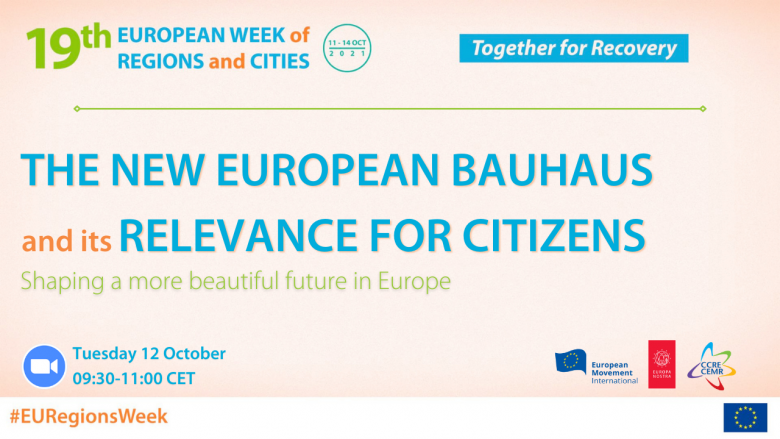Europa Nostra, European Movement International and CEMR host workshop on New European Bauhaus during EU Regions Week
On 12 October, the European Movement International, in partnership with the Council of European Municipalities and Regions (CEMR) and Europa Nostra, held the digital workshop “The New European Bauhaus and its Relevance for its Citizens: Shaping a More Beautiful Future in Europe” as a part of the EU Regions Week 2021. This workshop brought together the voices of Europe’s local and regional governments, cultural heritage stakeholders and young professionals and students to demonstrate the mobilising and transformative power of the New European Bauhaus for the future of Europe.

The workshop was moderated by Petros Fassoulas, Secretary General of the European Movement International, who introduced the panel and invited MEP Marcos Ros Sempere to share the views of the European Parliament on the New European Bauhaus. As an architect and urban planner, Marcos Ros has embraced this initiative undertaken by the European Commission and founded the New European Bauhaus Friendship Group, which gathers 36 members across 7 political groups and 17 committees of the European Parliament. “The New European Bauhaus is an opportunity to reconnect policies with citizens, to change our way of investing funds. Architecture has the power to change our lives, but only good architecture can improve our quality of life”, he stated.
The moderator then invited the representatives of the official partners of the New European Bauhaus to tell more about how their networks, universities, associations and organisations have contributed, and intend to further contribute, to the initiative.
Sneška Quaedvlieg-Mihailović, Secretary General of Europa Nostra, started by referring to the New European Bauhaus as a revolutionary initiative, which recognises that “the whole green transition cannot be achieved if we don’t catch the hearts and minds of citizens and don’t put culture at its heart”. She outlined how Europa Nostra has raised awareness of and mobilised its network of members and experts to contribute to the initiative.
The Secretary General also highlighted two major policy contributions to the New European Bauhaus made by Europa Nostra: the European Cultural Heritage Green Paper “Putting Europe’s shared heritage at the heart of the European Green Deal”, which recognises the New European Bauhaus as an important linkage between the European Green Deal and the realm of culture; and the Venice Call to Action “For a New European Renaissance”, which makes a strong plea to European leaders and heritage actors to duly integrate the transformative power of culture and cultural heritage among the strategic priorities for the reshaping of our societies, including the New European Bauhaus.
🗣️ @SneskaEN “the #NewEuropeanBauhaus is a revolutionary initiative, which has become a real community, a movement, giving a soul to the #EUGreenDeal. It ought to lead to a #NewEuropeanRenaissance as advocated in our Venice Call to Action”
📄https://t.co/5QzFvJe3an pic.twitter.com/Fq9dN3S0Fa— Europa Nostra (@europanostra) October 12, 2021
Flo Clucas, Spokesperson on Local Finances for the Council of European Municipalities and Regions (CEMR), who is also Councillor of Cheltenham, reminded how cities, municipalities and regions are crucial in the debate on the future of Europe, as the levels of governance closest to citizens. “If we capture the hearts of people in our communities, the New European Bauhaus will not only be a word but a real Renaissance for Europe“, she stated.
She also raised strong points to unlock investments by local and regional governments, such as the need to combine EU funds for consistent and integrated projects at local level; to reform the EU economic governance, as local government debt is counted within national debt; as well as to unleash the potential of local authorities to invest in one another.
Monika Skadborg, Board Member of the European Youth Forum, emphasised the importance of duly engaging youth in the New European Bauhaus, as a citizens-based initiative. “We need to involve Europe’s young generation to engage together in the New European Bauhaus and tap into existing initiatives for a successful green and digital transition in Europe”, she noted.
She also expressed her high hopes for the European Green Deal to be successful and have a real impact on people’s life, urging decision-makers to be brave enough to reach these ambitious goals.
The debate continued with lively exchanges among the speakers as well as with the audience. It concluded with an interactive Slido poll through which the audience could express their views on the New European Bauhaus and the future of Europe. Strikingly enough, only half of the respondents had heard about the ongoing Conference on the Future of Europe, a timely democratic exercise for European citizens to debate on Europe’s challenges and priorities.
At the end of our #EURegionsWeek inspiring workshop, participants shared their views on the #NewEuropeanBauhaus ➡️ #Togetherness, #Hope, #Beauty all refer to emotions & sentiments towards Europe! Let us join forces to ensure its implementation for the #FutureOfEurope #COFOE 🤝 pic.twitter.com/bKdom4NKRL
— Europa Nostra (@europanostra) October 12, 2021
On the other hand, participants expressed positive views towards the New European Bauhaus, which reinforces the need to empower citizens to co-create a more sustainable, beautiful and inclusive Europe, both in urban and rural areas, with culture as a unifying catalyst, as well as to ensure meaningful synergies with the Conference on the Future of Europe.






